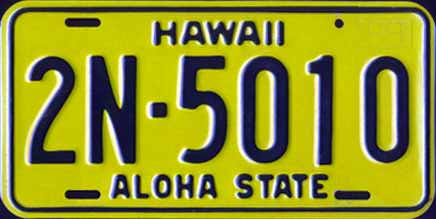 |
Hawaii 1969 passenger issue. This baseplate was issued starting at the end of 1968. It featured an etched "69" in the top right sticker box, and was valid without stickers through 1969. This plate was used with stickers through the end of 1975. The numbering format was 1A-1234, with the letter indicating the county of issue. "N" plates were one of the series indicating Honolulu county. "Aloha State" has been used on Hawaii plates since statehood in 1959. This was the first of an odd plate design with a small round bolt hole at the top right and larger slots in the other three corners. |
 |
Hawaii 1974 passenger issue (1969 base). Continuation of the baseplate above, this one carries a "74" validation decal. "F" plates were also issued in Honolulu county. |
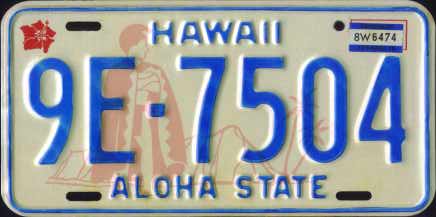 |
Hawaii 1978 passenger issue. At the end of 1975, this new graphic plate was issued to all vehicles. This plate featured an image of a Hawaiian warrior and Diamond Head, an extinct volcano near Honolulu. Again, passenger issues carried a 1A-1234 format with alpha county codes. "E" plates were also issued in Honolulu county. These plates were used with stickers through the end of 1980. |
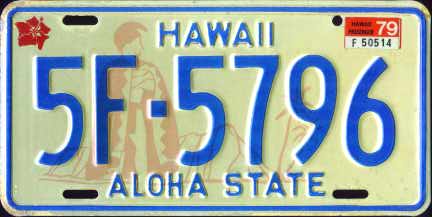 |
Hawaii 1979 passenger issue. Variation on the above plate, some Hawaii plates during this timeframe were made using these alternate dies for the state name, slogan and serial. I believe these plates were made by Irwin-Hodson in Oregon, while the previous variety was made by Polyvend in Arkansas. This is another Honolulu issue, in the "F" series. |
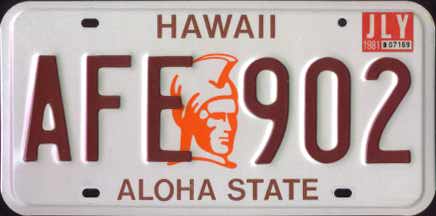 |
Hawaii 1981 passenger issue. In 1980, Hawaii changed to this baseplate, which featured an image of King Kamehameha. These plates switched to a more standard ABC-123 format, with letter blocks allocated to different counties. Plates in the Axx through Gxx blocks were once again issued in Honolulu county, which is by far the largest in the state. Early plates on this base were manufactured, I believe, by the Polyvend Corporation in Arkansas, using these dies similar to some previous Hawaii issues. Staggered registration began in 1981 for Hawaii, with this plate receiving a "JLY" sticker, expiring in July, 1981. Hawaii and Washington are the only two states to ever use "JLY" as the July abbreviation, as opposed to the more common "JUL." These plates were used through the end of 1991. |
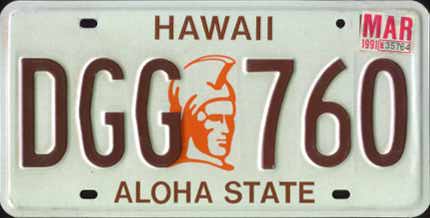 |
Hawaii 1991 passenger issue. Continuation of the 1981 Hawaii base, this plate was manufactured by Irwin-Hodson in Oregon and features their distinctive serial dies also seen on Oregon plates. This was another Honolulu county issue, in the Dxx block of plates. |
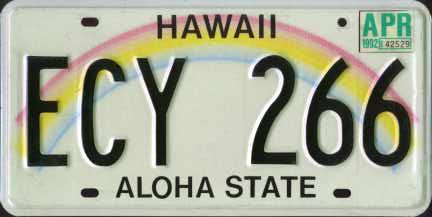 |
Hawaii 1992 passenger issue. In 1991, new plates were issued with a graphic image of a rainbow in the background. These plates followed the same format and county blocks as the 1981 issue, with Oahu (Honolulu) plates continuing from the E series. This remains Hawaii's current base as of today. |
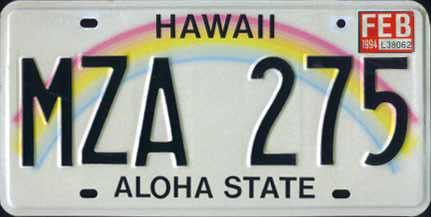 |
Hawaii 1994 passenger issue. Maui county issue on the rainbow base, this series picked up where the former series left off as well, with "early" plates issued in the late M series, later flipping the series back to MAA once the 1981-91 plates that had initially used those letters were off the road. Due to the relatively low population of the island, Maui did not need a second letter series assigned until 2011, when the Lxx series began. |
 |
Hawaii 1997 passenger issue. Continuation of the current rainbow baseplate. The dies used here are the same as those used on some earlier Hawaii issues, such as the 1969 and 1976 baseplates on this page. Hawaii plates are typically produced by Irwin-Hodson Corp. of Oregon, however I believe that the plates in this series using these dies were produced by the now-defunct Polyvend, Corp. of Arkansas. Oregon plates in the mid to late-80s were also produced by Polyvend using these same dies. This plate, issued in the "G" series, came from Oahu county. |









